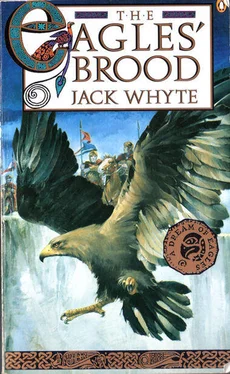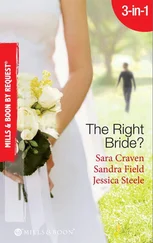They chased me for hours, higher and higher into the low hills, and only when night fell did I feel safe enough to dismount in a bush-filled hollow and feed my beasts before trying to snatch some sleep, rolling myself in my cloak and stretching out almost under the hooves of my three horses.
I had lost my pursuers. The following morning, creeping cautiously through the mists of early dawn on the hillside, straining my eyes and ears, I could see or hear no signs of them. I saddled up and moved out slowly, taking care to move in silence and to stay well clear of higher ground where I might be seen from below. Towards mid-morning I headed downhill again and angled my search once more in the direction of the broad path trampled by the armies moving ahead of me. All that day and the next I rode, seeing signs of death all around me, but hearing no human voice and seeing no signs of life.
Then, towards the middle of the afternoon of the third day after my encounter with the Cornishmen, I came on the aftermath of an extensive battle and rode slowly into a landscape that threatened to shrivel the mind. The killing ground was an enormous meadow, scattered with stunted trees and spread out at the base of a hollow formed by the sides of four shallow hills. Bodies lay everywhere, strewn in windrows and stacked in formations, scattered at random and heaped in piles, men and animals together. The fighting was over, but it had ended only very shortly before my arrival. The screams and moans of wounded men and horses were deafening, and the stink of blood and offal was a tangible presence. Hundreds of men and women moved through the chaos, drawn from I knew not where. Many of them were helping the wounded, although I knew that many others were plundering friend and foe, living and dead alike. Others, soldiers of both armies, were killing wounded horses, silencing their awful screams. No one approached me or sought to hinder me as I rode through the madness. Here and there I could see pairs of men, running in tandem, carrying stretchers. Other pairs moved more slowly, their stretchers loaded with wounded. I traced the centre of their activity and made my way to where they gathered, recognizing first one and then several of our own medics as I approached.
Mucius Quinto was in charge of the assembly ground. He was a grey-haired veteran almost as old as Lucanus, to whom he was second in command. I found him, flanked by two strong young soldiers, kneeling beside a young man whose breast was thick with blood. Quinto and his people had cleared an area on the eastern side of the great field, and had assembled rows and rows of wounded and dying men from both armies, dozens of rows and hundreds of men, more being brought in all the time. His helpers were our own soldiers, for the most part, although I saw many wearing the brown and black tunics of Lot's Cornishmen. There were no soldiers here in this field now, no enemies; only tired and grateful survivors. There were Druids there, too, moving among the wounded, and a scattering of women here and there, camp followers, I supposed, too stunned to really care. No matter who they were, they were working to appease the pain of the men who had been soldiers and were now men again, broken and bleeding.
Quinto did not even look up at me when I drew rein beside him. I climbed down from my saddle and stood watching as the young man at his knees, no more than a boy in truth, shuddered, convulsed and died, his blank and empty eyes staring up into mine. Quinto paused, his hand outstretched where it had frozen at the sound of the boy's death rattle, then his shoulders seemed to slump and his hand moved again, changing direction to close the staring eyes gently. He paused again, as though collecting himself, and then he was up and moving to the next man, while his two companions picked up the dead youth by the wrists and ankles and carried him away to make room for another. Before they had moved out of his sight Quinto was leaning over the new man, checking for a pulse, then flipping the man's tunic up to cover his dead face. He moved on again as two other men removed that body, and I moved with him. He still had not looked at me.
An ear-shattering scream erupted suddenly from a nearby knot of men clustered tightly around a table, all of them soaked in blood and hunched in a tense struggle to restrain someone beneath them, and I heard the distinctive rasp of a saw going through living bone. Quinto glanced towards the sounds, half checked his step, and then moved on to examine the next man in line. I stepped close to him.
"Quinto."
He turned on me, prepared to savage me for my interruption, then gaped in recognition and I saw his eyes move wonderingly the length of my clean, unbloodied, armoured body.
"Merlyn." His voice was lifeless, belying the surprise in his eyes. "-Where did you come from? A rescue? You're too late."
I shook my head, holding his gaze. "No, Quinto, I'm alone. What happened?"
"What happened?" His face twitched into an abrupt laugh that was chilling in its bitterness. "What happened? Can't you see? We had a war. A whole war in the space of two or three hours, and we lost." He looked away from me, his voice dropping as his eyes moved around the ranks of dead and dying. "God, how we lost! And what we've lost! A generation, Merlyn...an entire generation.... There'll be no quick recovery from this..." His voice died away completely, then resumed, his tone now hard and angry. "We weren't vanquished, Merlyn. We were utterly and completely crushed.. shattered and scattered.. .There must have been ten of them for every one of us. Outlanders, mostly. Ersemen. We didn't have a chance, and Uther led us in here blindly to this... this slaughter ground."
"How, Quinto? What happened? And where's Uther now?"
Quinto sniffed and wiped his nose wearily with his sleeve. "I haven't got time to talk. There's too much to do and I should be cutting. Some of my assistants are very young, and untrained—untrained for carnage on this scale, at any rate." He moved away and I followed him and three of the next four men he looked at were already dead. The fourth, a Cornishman, had a shattered leg. Quinto sent him to the cutting table. The next man, one of our own, was also dead, his chest crushed into a large, ball-shaped depression. Quinto shook his head.
"Your cousin's toy," Quinto grunted. "I wonder if he ever thought, when he came up with that bright idea, to see it used against his own people? And look at this." He had stooped to kneel beside another man, whose entire jaw had been shattered and torn away from his upper face. "Tell me, Caius Merlyn, what in the face of the sweet Christ's mercy can ever justify this kind of savagery by one man to another?
Or any of this madness?" I barely heard what he said. My mind was still on the wound the previous man had borne, made by what Quinto had called my cousin's toy.
"Quinto, what did you mean by my cousin's toy?"
He didn't look at me as he answered, intent as he was on attempting to repair the shattered face beneath him. "Just what I said..." He shook his head. "This is hopeless. Nothing I can do. At least he's not conscious..." Now he looked up at me and began rising to his feet again. "Your cousin Uther's toy. The flail he made; the ball on a chain. It's been—what—three years since then? Now the damn things are everywhere. I suppose you just can't keep a good idea secret."
My head was reeling. What was he telling me? He had moved on again and I had to step quickly to catch up to him, clutching at his sleeve.
"What do you mean, they're everywhere? I haven't seen any."
He frowned, angry at such trivial talk in the face of so much need. "Then you must be blind. What else do you think could make a wound like that, crushing bones to jelly?" He jerked his thumb savagely towards the man with the crushed chest. "Half the men in Camulod have them, and more than half the men in Lot's damned army, it appears. Now leave me alone. I've got work to do."
Читать дальше









